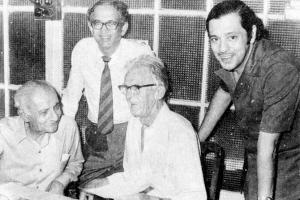Anant Setalvad did commentary in an age when the great opening batsman Vijay Merchant too lent his voice for listeners in the 1960s and 1970s

Anand Setalvad (right) poses with Vijay Merchant, cricket writer KN Prabhu (standing) and Australian cricket writer Ray Robinson in the 1970s. Pic courtesy: Vijay Merchant in Memoriam by Marcus Couto
“POLISHED.” That’s the word many used to describe All India Radio (AIR) cricket commentator Anant Setalvad, who passed away after a prolonged illness at 84 ON Sunday.
ADVERTISEMENT
Setalvad did commentary in an age when the great opening batsman Vijay Merchant too lent his voice to listeners in the 1960s and 1970s. He even commentated in the 1990s and his commentary when Vinod Kambli reached three figures in the Mumbai Test against England was featured in a documentary on the 1992-93 series called Bombay Brownwash.
Talking about documentaries, Setalvad helped in the production of a fine one by interviewing illustrious all-rounder Vinoo Mankad for a Films Division of India film.
Setalvad’s excellence was underlined by commentator Harsha Bhogle’s tweet in reaction to the news of his passing away: “As a young man, I imagined I was #AnantSetalvad and I would try to copy his style but could never get the lilt and authority that his distinguished voice produced. He was always the commentator I wanted to be. The brightest light in the finest era of radio broadcasting in India.”
Setalvad was never over the top, did not believe fuelling passions that ran high with spectators at the ground or outside. “The commentary of Anant Setalvad has also been praised because it is restrained, accurate, to the point and based on sound cricket knowledge which he built up as a club cricketer,” wrote Australian cricket historian Richard Cashman in Patrons, Players and the Crowd – The Phenomenon of Indian Cricket.
The Cricket Club of India benefited from Setalvad’s contribution as a medium pacer in the 1960s. Padmakar Shivalkar, the Mumbai left-arm spinner, who famously missed out on Test honours, recalled Setalvad’s ability to stick to a disciplined line and length and swing the ball. They were both on CCI’s 1961-62 tour of Australia. “That was a great tour for me [100 wickets]. Apart from learning so much, the trip also helped me make it to the Bombay team. Anant was very helpful. ‘You are doing fine, keep it up,’ he kept saying to me,” recalled Shivalkar, terming Setalvad as a fine student of the game, who loved talking cricket.
Cashman mentioned in his book that Setalvad’s commentary during the India v West Indies Test match at Calcutta in the 1978-79 season helped keep the emotions of the crowd in check when bad light and time-wasting tactics prevented India from taking the last West Indies wicket which would have resulted in a victory for the hosts. “Setalvad urged the crowd to remain calm and to accept the verdict of the umpire,” wrote Cashman.
Not long after midnight on Saturday, the eternal umpire ruled Setalvad out, but his polished voice stays in memory.
Catch up on all the latest sports news and updates here. Also download the new mid-day Android and iOS apps to get latest updates
 Subscribe today by clicking the link and stay updated with the latest news!" Click here!
Subscribe today by clicking the link and stay updated with the latest news!" Click here!






